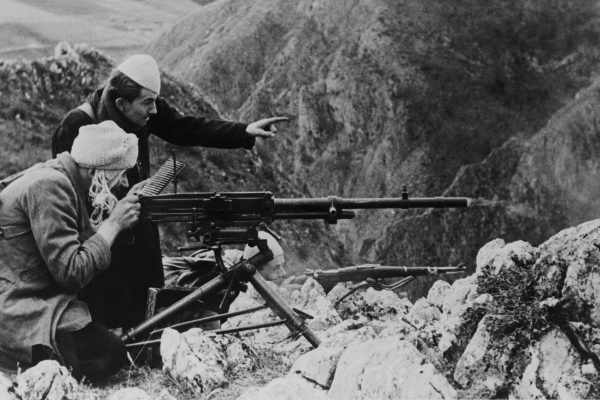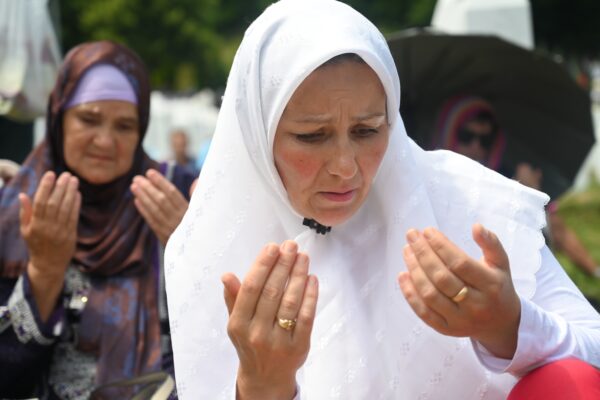“I drove one hour to get there, and we worked until 3AM, to take the coffin downstairs from the third floor. You can’t imagine, the whole situation was very hard…”
“I drove one hour to get there, and we worked until 3AM, to take the coffin downstairs from the third floor. You can’t imagine, the whole situation was very hard…”
Italy has been one of the worst-hit countries from the Coronavirus, and according to the World Health Organization, has almost 106,000 cases with over 12,400 deaths so far (as of April 2nd, 2020). These horrifying numbers only highlight the catastrophic effect COVID-19 has had on Italy and the effect it has on society – including Muslims in Italy.
According to new reports, there has been a growing lack of space for Muslim burial spots, as the number of deaths from COVID-19 in Italy soar into the tens of thousands. There are currently only 58 Muslim cemeteries in the entire country of Italy, and Italian Muslims are now struggling to bury those who have passed away from the virus.
Although many Muslims in Italy have previously opted for the repatriation of those who have passed away, with Italy being home to around half a million Moroccan immigrants, with the borders now closed from COVID-19 measures by governments there is no choice but to try and find space for burials within Italy for the Muslim community.
Tallal Khalid, speaking to TRT World, runs a Muslim funeral agency in Brescia, northern Italy – one of the worst-hit areas from COVID-19. Struggling to bury Italian Muslims who have passed away from the virus has been a painful experience – without the proper space and land to bury Muslims, Khalid explains that it has taken a toll on the entire Muslim community.
In one example, a Muslim woman from a small town near Brescia passed away from COVID-19, however there was no Muslim cemetery in the small town of Pisogne where she was from – and with the family struggling to find a place to bury her as Italian regulations state the person must be buried only in the municipality where they died, she was left in a coffin inside the family home for reportedly a week.
Khalid was finally called in to help after the intervention of the Union of Islamic Communities in Italy (UCOII), and the Brescia municipality agreed to grant the woman a small place in the local cemetery, where there is a small plot of land for Muslim burials. Khalid stated:
I drove one hour to get there, and we worked until 3AM, to take the coffin downstairs from the third floor. You can’t imagine, the whole situation was very hard…We took her to the warehouse at the cemetery and after two days she was eventually buried. But they made it clear it was an exception, as they have only 10 places left and they want to keep them for Brescia’s residents.”
The UCOII have handed out leaflets to local Muslim communities in Italy, that give advice and guidance around the new regulations for burials and funerals – many Islamic rites done during burials must now be avoided in line with advice from health professionals, for example the ghusl (ritual washing or purification) done on the body and the collective salaat al janaaza, a communal prayer during the funeral.
In addition, the UCOII has also published in detail on their website the list of the 58 cemeteries in Italy that have a Muslim burial space, as well as Muslim-run funeral services that the Muslim community in Italy can get in touch with for help.
Yassine Lafram, the President of the UCOII, stated:
As soon as the virus spread, we immediately decided to close all the Islamic centers and mosques, and to suspend all our activities, to avoid gatherings. It was not only a matter of responding to the Interior Ministry decrees, but also to show our sense of belonging and our civic sense.”
As Italy struggles to cope with the horrifying reality of the COVID-19 pandemic, it remains one of the worst-hit regions in the world. Despite this, front-line doctors, nurses, and emergency workers continue to work tirelessly in Italy to help contain the spread of the virus – and their collective actions can only be described as heroic.
For now, people like Khalid continue to work selflessly for the Muslim community in Italy affected by COVID-19 as well. Speaking of the trauma that has come from this pandemic, Khalid also has hope however:
We just want to get over this and forget everything…[but] it is our duty and I feel honoured to do this. In the end, as we say, we are in the hands of Allah.”
According to the World Health Organization, there are currently almost 858,000 cases across the world in 206 countries, with a little over 42,000 deaths in total.





